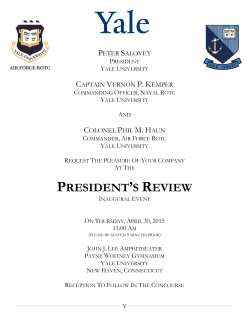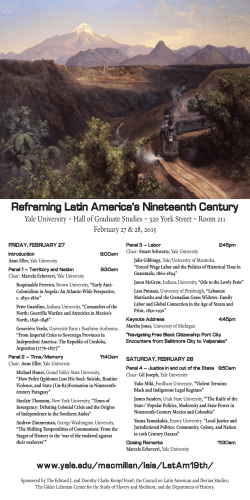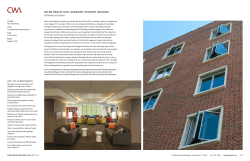
87.4 Article Sign-Ups
Yale Scientific 87.4 Article Sign-Ups Thank you for your interest in writing for the Yale Scientific Magazine (YSM), Yale’s premier science publication. The following articles are ideas that we have generated for the upcoming issue with the theme “Crime, Justice, and Science” (to be published October 2014). Please read through this list, paying attention to content and the required word-lengths, and then select up to four articles that you would be interested in writing. Please use our Article Sign-Up survey, which you can access through the emailed link and on our website, www.yalescientific.org, to make your selection. Articles in the YSM are divided into three sections: News, Full-Lengths, and Features. The News section covers the latest breakthroughs and discoveries occurring at Yale University's cutting-edge science research departments and highlights awards and other noteworthy accomplishments pertaining to the Yale science community. The Full-Lengths section delves into these exciting developments in greater detail. These articles are longer pieces that explore and explain the science behind Yale professors' work or recent papers and are written after conversing with the professors about their research. And our Features section includes ongoing scientific issues or topics of interest from a broader range of fields, from global scientific phenomena to student profiles. While you do not have to select more than one article, the editorial staff cannot guarantee that you will receive your first-choice assignment, even if you have written for us before. We ask that new writers select shorter articles for their primary preferences, because full-lengths and extended feature pieces are usually given to experienced writers. The YSM has also recently expanded to include a new section of articles published exclusively on our website. Topics for this wave of online articles are listed under the last section in this document. Keep in mind that writers are also welcome to send an article topic pitch to Grace Cao ([email protected]) or Jason Young ([email protected]) at any time to get involved with online article writing. Our entire Masthead is eager to have you join our staff. If you have any questions, please do not hesitate to contact us. Welcome (back) to the Yale Scientific Magazine! Rebecca Su – Editor-in-Chief Chanthia Ma – Managing Editor Naaman Mehta – Managing Editor Julia Rothchild – Articles Editor Andrew Qi – News Editor Payal Marathe – Features Editor Grace Cao – Online Articles Editor Jason Young – Online Articles Editor NEWS News Byte: New carnivorous crustacean discovered, brought to life (240-260 Words) A research team including Peabody Director Briggs has identified a 435 million-year-old shrimp-like crustacean, Thylacares brandonesis. Through modern imaging techniques, they reconstructed a 3D model of the specimen, revealing details about its behaviour. News Byte: Unexpected insights on how humans perceive groups (240-260 Words) People's mental responses to group agents such as corporations and governments are an important but not well-studied topic in psychology. A recent study led by Prof. Joshua Knobe showed that people can attribute a mental state to a group that they would not attribute to an individual within the group, and that brain activation was similar when thinking about groups vs individuals. News Byte: Robert Langer delivers entrepreneurship seminar (240-260 Words) Robert S. Langer, Institute Professor and the Kenneth J. Germeshausen Professor of Chemical and Biomedical Engineering at MIT, is visiting Yale on September 14th to speak on biotechnology entrepreneurship. Widely considered to have founded the fields of drug delivery and tissue engineering, his influence on Yale is left through his mentorship of current biomedical engineering professors Mark Saltzman and Laura Niklason. News Byte: Microscopy advances provide new lens for observing yeast (240-260 Words) Quantitative microscopy is useful for observing the movement of molecules over time, but limits in microscopy have thus far lowered its precision. Yale researchers led by Thomas Pollard have overcome these challenges by developing a “temporal super-resolution” microscopy method to observe endocytosis in yeast. News Article: Student innovators win BMEStart competition for organ transport system (650-750 Words) A team of students won $10,000 for their project designed in Joseph Zinter and Richard Fan’s Medical Device Design and Innovation course MENG 404. Their transport and perfusion system, which assists notoriously difficult intestine transplants, has been approved for investigation by multiple New England organ banks. News Article: Drought and agriculture in ancient civilizations (650-750 Words) Through carbon isotope analysis, a group led by Professor Frank Hole connected historical climate fluctuations with agricultural crises in Near East communities. Their work shines a light on how ancient human civilizations responded to environmental conditions. News Article: Faculty spotlight on David Rand (650-750 Words) Professor Rand draws upon empirical observations, mathematical models, and evolutionary biology to investigate the origins of human cooperation. His groundbreaking research has been featured on TIME, Forbes, and CBS, among others. . News Article: Mounting a defense against herpes (650-750 Words) The Iwasaki group found that local lymphatic systems retain a particular resident T cell that defends against herpes reinfection, giving insight into a possible herpes vaccine. FULL-LENGTH ARTICLES Short Full-Length: Science of Swarms (1100-1300 Words) In nature, it is very common for groups of social animals to behave collectively--in flocks, schools, herds, crowds or swarms. To better understand this type of behavior, Yale researchers Nicholas Oulette and James Puckett study and model the dynamics of flying midge swarms. The findings in their most recent study may impact bioinspired engineered systems that are based on collective animal behavior. Short Full-Length: A Smarter Way to Track Nutrition (1100-1300 Words) Proper nutrition plays an instrumental role in preventing the onset of diabetes, cancer, and cardiovascular disease, but measuring dietary habits is a constant challenge for nutritionists. A novel method developed by Yale researchers now allows scientists to non-invasively investigate an individual’s levels of fruit and vegetable intake. By using Raman spectroscopy to measure carotenoid compounds--biomarkers of vegetable and fruit consumption--the researchers avoid the bias and error of conventional methods. Short Full-Length: Crime-Fighting Genes (1100-1300 Words) Yale researchers are working on using SNPs (Single Nucleotide Polymorphisms) to identify and distinguish microhaplotypes--small groups of linked alleles. They have found that microhaplotypes can provide telling clues for defining ancestry, and also for determining familial relationships. These microhaplotypes, the authors claim, are poised to become a powerful new tool in genetic-based forensics. Short Full-Length: Tech Start-Ups at Yale (1100-1300 Words) Yale University has recently seen a surge in technology-driven entrepreneurship. For example, the Yale bioscience startup Isoplexis (led by Biomedical Engineering professor Rong Fan and School of Management graduate Sean Mackay) recently received $1.25 million in funding for its cell assay device. The Yale Entrepreneurial Institute also hosted several other promising tech ventures in its summer accelerator program, such as Trinity Networks and Catalytic Innovation Partners. Long Full-Length: Curbing the Heroin Epidemic (1400-1600 Words) In light of New Haven’s summer “heroin epidemic,” a recent Yale study examines the administration efficacy of buprenorphine, a drug for treating opiate addictions. Specifically, it challenges rigid policies on dose and duration that can negatively affect patient care. This full-length article will investigate the local rise in heroin use, the results of the Yale study, and its recommendations for policymakers and clinicians. Long Full-Length: Women in Science, Now and Then (1400-1600 Words) This full-length article will be a survey of notable women in science at Yale, such as Joan Feigenbaum, Christine Cunningham, and other faculty members. By interviewing female alumni, undergraduates, and faculty members, this article will comment on what has changed in Yale’s scientific community over time. FEATURES Q&A: What makes the World Cup soccer ball special? (200-250 Words) The most recent World Cup featured a newly-designed soccer ball with fewer panels. How does this design work, and how does it affect the game? Q&A: What happens in our brains when we watch a movie? (200-250 Words) Movies have the power to sync the brain activity of hundreds of people in a theater. How does this work, and what parts of the brain are involved in the overlap? TV Series Review: Duck Quacks Don’t Echo (350-450 Words) A television series on the National Geographic Channel, originally created as a celebration of science, showcases three friends testing over-the-top scientific hypotheses. (The selected writer will watch a sampling of episodes in this series and comment on its merit.) TV Series Review: Through the Wormhole (350-450 Words) Morgan Freeman hosts this Discovery Channel series, which explores questions of human existence, space, and the origin of life. (The selected writer will watch a sampling of episodes in this series and comment on its merit.) Alumni Profile: David Spiegel (YC ‘67) (650-750 Words) David Spiegel graduated from Yale in 1967 with a philosophy degree, and went on to become an award-winning researcher in psycho-oncology. He currently works as Director of the Center on Stress and Health at Stanford University. Undergraduate Profile: Yetunde Meroe, '16 (650-750 Words) Meroe was a Lazarus summer intern at the Yale Farm, and endeavors to combine her interests in chemical engineering, agriculture, food policy. Mythbusters: Weather: A Not-So-Simple Phenomenon (650-750 Words) The Farmer's Almanac has predicted a brutal upcoming winter, but the NOAA, using different methods, disagrees. This article will explain why simple conceptions of global warming are wrong, and why predicting climates on a grand scale is a more nuanced, complicated process. Hot summers don't necessarily have any effect on the winter that lies ahead. Unsolved Mysteries: The Mpemba Effect (650-750 Words) The Mpemba Effect occurs when boiling water freezes more quickly than cold water -- a contradiction to the laws of thermodynamics. The phenomenon has been demonstrated numerous times, but scientists are still seeking an explanation. Short Feature: New Hope for Damaged Hearts (650-750 Words) A new drug to counteract heart failure did surprisingly well in clinical trials -- much better than expected for a drug with an alternative mechanism. The drug not only acts as a blockbuster, but it inhibits the enzyme neprilysin, which may be the reason for its astounding success. Short Feature: Sailing Stones Mystery Unraveled (650-750 Words) The sailing stones of Death Valley have perplexed scientists for decades. Now, researchers think they have found an explanation for how a light breeze is enough to move these massive rocks. Short Feature: Illegal Juice (650-750 Words) Glenn Adam Chin, responsible for a mass steroid outbreak of 2012, was finally arrested at Logan International Airport on September 4. This article will explain the science of drug contamination. How did Chin mess up, and why did this cause an outbreak of meningitis? Long Feature: A Three-Parent Embryo (1000-1300 Words) Mitochondrial replacement may make it possible for women with serious genetic disorders to have children with no risk of passing on the fatal mutation, and may allow women who couldn't previously have biological children to do so. This new idea is controversial, of course, because it messes with human genetics in a way that has never been done -- or approved -- before. Long Feature: Ebola, the Modern Pandemic (1000-1300 Words) Ebola is increasingly a concern to people all around the world, with cases popping up in various developed countries as well. This article will describe how this outbreak began, the impact of the disease on people, and the greater epidemiological impact on societies. The writer may also discuss the recent sequencing of the new Ebola genome by researchers at Harvard. ONLINE ARTICLES News Byte: In obese adolescents, leptin linked to emotional responses to food (250-300 words) Adolescent obesity is a major health issue in the US. Yale researchers showed that compared to lean adolescents, obese adolescents have increased activation in brain regions associated with motivation and reward in response to high fat foods. This is associated with higher levels of circulating leptin, a hormone controlling satiety. News Byte: Cropland expansion cools global climate (250-300 words) Deforestation due to cropland expansion is often considered to be a contributor to global warming. A new Yale study shows that it may also have a cooling effect, as forests also emit volative compounds that can cause climates to become warmer. News Byte: Yale dean awarded in biology (250-300 words) Yale Dean of Forestry and Environmental Sciences Peter Crane was awarded an international prize for biology by the Japan Society for the Promotion of Science (JSPS) for his work on plants. News Byte: New lecture on the evolution of beauty (250-300 words) This fall, the DeVane Lecture Series will discuss the evolution of beauty and aesthetics, from evolutionary biology to art and culture. The course is open to the public but can be taken by Yale College students for credit. News Article: Modified nanoparticles for gene editing in the lung (450-500 words) Using nanoparticles is a useful method for gene delivery and editing. Yale researchers led by Dr. Mark Saltzman used special surface modified nanoparticles to allow for more efficient gene editing in the lung. News Article: New taste and pheromone receptors identified in Drosophila (450-500 words) A group of 35 receptors with no previous known function has been identified as being expressed in all taste organs of Drosophila. Some of the receptors have been shown to play an important role in courtship and mating. News Article: Epsin required for endocytosis (450-500 words) Clathrin coated pits are important for endocytosis. Epsin, an evolutionarily conserved adaptor found in clathrin pits whose function is unknown, was found to be necessary to generate the force leading to clathrin pit fission. News Article: Yale astronomers observe birth of massive galaxy (450-500 words) A team led by Yale astronomers has observed the formation of a massive, ancient galaxy created 11 billion years ago. This is the first time the formation of such a massive galaxy has been observed, as changes in the modern universe prevent the conditions required for their formation. Feature: Cyborg Moths (450-500 Words) Researchers at North Carolina State University have created "cyborg moths" that are part living tissue and part wire. By implanting an electrode into the developing pupa in its cocoon, they were able to collect data about electric pulses sent to muscles during flight. Feature: Bringing Back Birdie (450-500 Words) On the 100th anniversary of the extinction of the passenger pidgeon, scientists are contemplating the "de-extinction" of a species Feature: Rosetta Arrives at Comet (450-500 Words) After over 10 years and nearly 4 billion miles, the spacecraft Rosetta has arrived at the comet 67P/Churyumov-Gerasimenko. It will gather data and take pictures to understand how the comet developed. Feature: Monkey See? (450-500 Words) In a recent study, scientists had chimps and humans play a strategy game where the chimps outplayed the humans, suggesting they might possess a better memory and sense of strategy than we do.
© Copyright 2026











